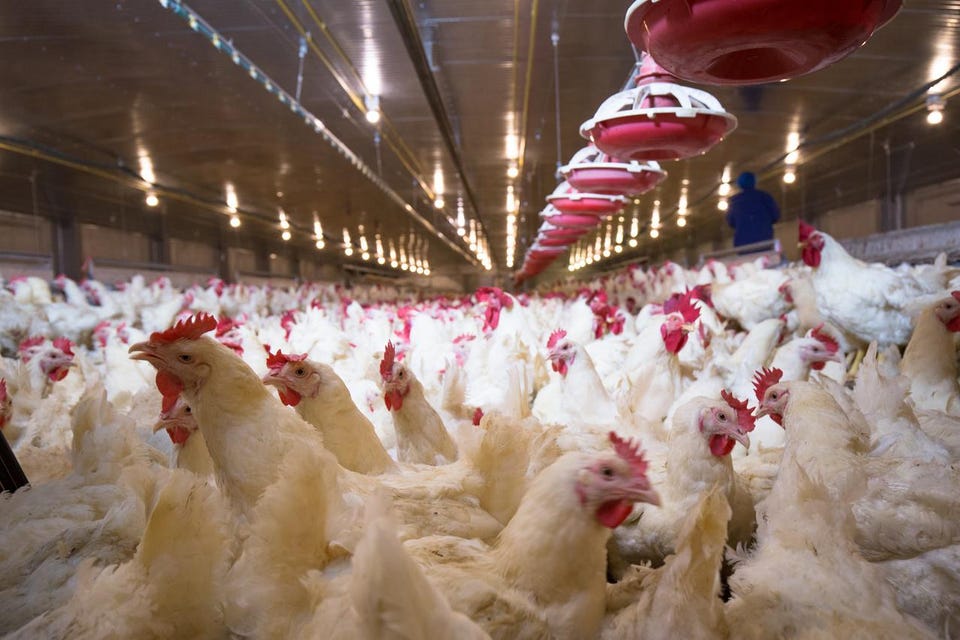L ong-delayed approval from the Department of Justice on Cargill and Continental Grain’s $4. 5 billion acquisition of publicly traded Sanderson Farms has the barnyard buzzing: Could even more consolidation in the chicken industry be coming? Farmers, distributors and truckers — stakeholders up and down the supply chain — are asking the question now that there’s a new poultry powerhouse backed by Cargill, a major trader of grain, the top expense for chicken farmers, and Continental Grain, the owner of Wayne Farms, America’s sixth-largest chicken processor. The Justice Department spent a year drilling deeply into their proposed joint acquisition of Sanderson, the third-largest U.
S. processor. The new company will control an estimated 15% of the chicken market and push the market share of the top four competitors to more than 60% from about 50%.
It could just be the start of a wave of consolidation for the chicken industry, experts warn. More of a crunch would further centralize power among the biggest processors. When that’s happened in the past, chicken processors have often charged higher prices and kept more of the profits, while there’s been little change to what farmers and factory workers are paid.
Consumers ultimately lose, and have fewer choices in the supermarket, says Joe Maxwell, the president of Farm Action, an advocacy group which consulted with Justice Department investigators as they deliberated on the merger. “These are two global food giants. It’s very disturbing,” Maxwell says.
“The manipulation which can go on within the market on feed costs, knowledge, data, could be used against the other 40%, only causing greater concentration in the future. When you get to these levels of control of a market, it allows for corruption, collusion and price-gouging. ” The DOJ’s approval comes at a time when consumers face the highest food prices in 40 years.
Chicken prices have risen 13% since last year. Consumer prices in general have increased 9% in the same time period. Concerns over a further consolidation of the industry were tempered somewhat by the Justice Department’s proposed consent decree with Sanderson, Cargill and Wayne that would monitor the chicken companies for anti-competitive practices, pay workers for past harms and prevent companies from exchanging information about wages and benefits.
All consent decrees must be approved by a court after a 60-day period allowing for public comments. The consent decree would be significant. There’s been a class action lawsuit gaining steam for months centered on allegations of a decades-long wage-manipulation scheme across workers in the poultry industry.
The proposed decree would require three processors, including Sanderson and Wayne, which are both named in the lawsuit among more than a dozen defendants, to pay $84. 8 million to processing-plant workers. The lawsuit is part of a broader anti-competition probe into the chicken industry by the DOJ that’s been going on for years.
It would also end the chicken industry’s controversial “tournament system,” where poultry growers under contract would compete against each other for who could raise the best bird in the eyes of a processor like Sanderson. The problematic system promised to pay growers a certain amount, per their contracts, but in reality, growers were paid on a sliding scale. The winners at the top received an additional bonus, but that money, essentially, had been earmarked for growers with the worst performance, who instead got a pay cut.
The consent decree would enforce the simple idea that chicken growers are, in fact, paid the base pay compensation that is already outlined in their contracts. If the Wayne-Sanderson joint venture didn’t use the tournament system, “the dynamics of the entire poultry industry may well change,” Maxwell says. A bonus system would also be formalized through the consent decree.
Companies would have to ensure that the bonus is never greater than 25% of the base price paid. That would mean that anytime costs go up, the base price would also increase. Previously, when the main cost for growing chickens — the corn and soy fed to the birds — would increase, farmers would often lose money because their rates didn’t change.
Wayne-Sanderson is now based in Georgia and has chicken processing plants and prepared foods facilities across Alabama, Arkansas, Georgia, Louisiana, Mississippi, North Carolina and Texas. Roughly half of the poultry producers across the country only have the option of working with one or two poultry processors in their regional market. Prior to the merger, Wayne and Sanderson had both worked in Texas and Mississippi, but they’d produced different products and hadn’t gone head-to-head against each other for bids.
Federal policy solutions are needed to restore fair and competitive conditions, according to Patty Lovera, policy director for Campaign for Family Farms and the Environment. Lovera says her organization is prepared for more consolidation as a result of the Wayne-Sanderson deal. “This is already an industry where a handful of companies have a lot of power,” Lovera says.
“Any deal like this makes that trend even worse. ”.
From: forbes
URL: https://www.forbes.com/sites/chloesorvino/2022/08/05/higher-chicken-prices-expected-after-45-billion-poultry-merger-wins-us-approval/



